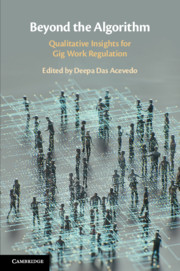Book contents
- Beyond the Algorithm
- Beyond the Algorithm
- Copyright page
- Contents
- Figures
- Tables
- Foreword
- Acknowledgments
- Introduction
- 1 The Rise and Scope of Gig Work Regulation
- 2 An Uber Ambivalence
- 3 Invisible Work, Visible Workers
- 4 The Importance of Qualitative Research Approaches to Gig Economy Taxation
- 5 Just a Gig?
- 6 Algorithmic Management, Employment, and the Self in Gig Work
- 7 Regulating Transportation Systems without Authority (or Data)
- 8 Words Matter
- 9 Rewriting the Rules
- 10 What Regulators Could Gain by Listening to Rideshare Drivers
- Index
4 - The Importance of Qualitative Research Approaches to Gig Economy Taxation
Published online by Cambridge University Press: 22 October 2020
- Beyond the Algorithm
- Beyond the Algorithm
- Copyright page
- Contents
- Figures
- Tables
- Foreword
- Acknowledgments
- Introduction
- 1 The Rise and Scope of Gig Work Regulation
- 2 An Uber Ambivalence
- 3 Invisible Work, Visible Workers
- 4 The Importance of Qualitative Research Approaches to Gig Economy Taxation
- 5 Just a Gig?
- 6 Algorithmic Management, Employment, and the Self in Gig Work
- 7 Regulating Transportation Systems without Authority (or Data)
- 8 Words Matter
- 9 Rewriting the Rules
- 10 What Regulators Could Gain by Listening to Rideshare Drivers
- Index
Summary
As the United States tax system continues to grapple with how to tax workers in the gig economy, it confronts a number of questions about the nature and composition of the sector as well as the tax issues confronted by its participants. Many of these questions have proven difficult to answer due to a lack of adequate information. But the answers are important and will shape how tax and other areas of law (such as employment law, labor law, and antitrust) respond to the gig economy. Thus, the question of how to obtain the data and information necessary to formulate sound policies for gig work is vital. This chapter discusses the limitations of quantitative empirical research on the gig economy and argues that incorporating more qualitative approaches will help generate a more comprehensive understanding of the tax policy issues involved. Adoption of a diverse set of research approaches is crucial because the administrative tax return and labor survey data are incomplete and are shaped by prior decisions of gig economy firms and participants. Many questions remain that such quantitative data, by its very nature, cannot answer. This chapter first identifies the key tax issues at stake in the gig economy, including tax administration, worker classification, and tax impacts on workforce decisions. It then discusses the key ways in which quantitative approaches do not fully capture the tax issues at stake. Finally, it details how qualitative research methods such as interviews and case studies can flesh out gaps in the quantitative data, can help interpret quantitative data, and can help answer questions that extend beyond the scope of quantitative data, yielding a richer account of gig economy tax issues than that provided by quantitative tax administrative and labor survey data alone.
Keywords
- Type
- Chapter
- Information
- Beyond the AlgorithmQualitative Insights for Gig Work Regulation, pp. 82 - 102Publisher: Cambridge University PressPrint publication year: 2020

